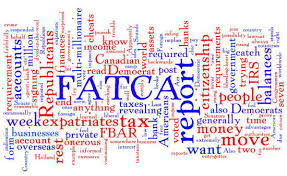The Internal Revenue Service is having trouble dealing with the information it’s getting from foreign banks about U.S. taxpayer assets under the Foreign Account Tax Compliance Act because of problems with the data and various mismatches, according to a new government report.
The report, from the Government Accountability Office, found that data quality and management issues have limited the effectiveness of the IRS’s efforts to implement FATCA, which was part of the HIRE Act of 2010. The law required foreign financial institutions to send information about U.S. taxpayer assets or else face stiff penalties of up to 30 percent on their income from U.S. sources. The law proved to be controversial, and the Treasury Department needed to negotiate intergovernmental agreements with the tax authorities in dozens of other countries to get them to agree to turn over data under their own banking secrecy laws.
In most cases, the foreign banks turn over the information first to their own home country’s tax authority, which in turn transmits it to the IRS. The IRS also needed to develop portals where the information could be sent, as well as forms, instructions and other guidance and technology systems to implement FATCA.
However, even with all that work, the IRS has had difficulties matching the information reported by foreign financial institutions with U.S. taxpayers' tax filings due to missing or inaccurate Taxpayer Identification Numbers provided by the foreign banks.
On top of that, the IRS lacks access to consistent and complete data on foreign financial assets and other data reported in tax filings by U.S. individual taxpayers, partly because some IRS databases don’t store foreign asset data reported from paper filings.
 Another major problem for FATCA has been the hardships faced by U.S.-born expatriates. Some Americans living abroad can't get services from foreign banks that find the law too burdensome. Even American actress Megan Markle, who married Prince Harry in the U.K. last year, is expected to face difficulties with tax compliance. With the couple’s baby due soon, some observers have speculated their children could be subject to U.S. tax, unless she renounces U.S. citizenship.
Another major problem for FATCA has been the hardships faced by U.S.-born expatriates. Some Americans living abroad can't get services from foreign banks that find the law too burdensome. Even American actress Megan Markle, who married Prince Harry in the U.K. last year, is expected to face difficulties with tax compliance. With the couple’s baby due soon, some observers have speculated their children could be subject to U.S. tax, unless she renounces U.S. citizenship. The Treasury's inspector general for tax administration, J. Russell George, left, talks at a hearing on Capitol Hill. (AP) A report from the Treasury Inspector General for Tax Administration found that although the IRS had spent nearly $380 million to carry out FATCA, the agency “is still not prepared to enforce compliance” with it. Specialists say catching undisclosed overseas assets is still a high priority for the IRS. But the report points to logistical problems, including complex FATCA forms and inaccurate filings, that are undermining enforcement, or at least the appearance of it, which could come with its own problems.
The Treasury's inspector general for tax administration, J. Russell George, left, talks at a hearing on Capitol Hill. (AP) A report from the Treasury Inspector General for Tax Administration found that although the IRS had spent nearly $380 million to carry out FATCA, the agency “is still not prepared to enforce compliance” with it. Specialists say catching undisclosed overseas assets is still a high priority for the IRS. But the report points to logistical problems, including complex FATCA forms and inaccurate filings, that are undermining enforcement, or at least the appearance of it, which could come with its own problems.The IRS Had Warned Taxpayers in March That the Practice of Hiding Money in Unreported Offshore Accounts Remains on Its "Dirty Dozen" List of Tax Scams, Noting That As the Agency "Intensified Efforts on Offshore Issues in Recent Years, Many Taxpayers Have Voluntary Disclosed Their Participation in These Schemes."
Read more at: Tax Times blog








